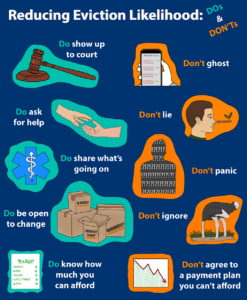The Eviction Process in Massachusetts
In Massachusetts, a court eviction of a tenant can be expensive and time-consuming. The eviction court process in Massachusetts is called a “summary process.” The goal of an eviction is for the owner to regain possession of the rental unit. Often, there are alternatives to eviction to regain rental possession.
However, in some cases, a court eviction is the only choice. Never attempt a “self-help” eviction on your own. Unilateral evictions are very illegal. You may never change the locks, turn off utilities or destroy your rented premises in attempts to force tenants out.
When Eviction Is Your Only Choice
Below is an outline of the eviction process in Massachusetts (aka summary process).
Community Mediation
Massachusetts now requires court mediation as a step in the court’s two-tier eviction process. The Massachusetts Office of Public Collaboration (MOPC) uses state funding to train and supervise volunteer mediators in a different, out-of-court mediation process. Out-of-court mediation is free and may produce better results.
In FY2024, the Mass. Housing Mediation Program, part of the MOPC, oversaw 1,487 mediation cases. HMP surveyed 958 mediation participants:
- 70% of mediated cases reached an agreement;
- 91% of participants surveyed were satisfied with the process; and
- 81% preferred mediation over alternative services.
There are no income eligibility requirements. LLCs, Incs, and other entities do not have to hire an attorney.
An Example Eviction for Nonpayment
No two evictions go exactly the same way. This nonpayment example gives you an idea of major milestones in an eviction. Your situation will vary.
In this example, we're assuming “best case,” meaning all parties are acting in their best interest and the process moves forward as quickly as possible absent extraordinary delay.
Some landlords may be tempted to charge a late fee for overdue rent instead of starting the eviction process. Ask yourself if this really helps. For starters, it is unlawful to charge a late fee before the rent is 30 days late, but you can file for eviction as soon as rent is one day late. What’s more, tacking on a late fee does not guarantee your tenants will pay the rent (or the late fee), and probably only serves to increase their housing debt. As you will see in the following timeline, starting the eviction process is always a good idea as Plan B; you can negotiate and incentivize alternatives in parallel.
This nonpayment eviction scenario starts in November. The apartment rent is $1,450 per month and this is a tenancy at will.
Nonpayment of rent
On November 1, the tenant sends you an apology. They explain everything going on in their life. They say they're going to get you the rent somehow and they ask you to wait.
Should you wait to begin eviction?
You have no obligation to wait to serve a notice to quit, unless such a grace period is included in the rental agreement. In Massachusetts, rent is late the day after it is due and not paid. You may opt to grant your tenant a grace period, but that is not required, and we do not recommend it. If your renter is eligible for social services, waiting helps no one; many services are contingent on getting to court.
For this scenario, let’s say this is a tenant you want to keep, and you decide to give them a grace period. You wait nine more days, until November 10. The tenants are silent. You believe they are going to have to move back in with their family, but they have stopped responding to texts. You decide to start eviction by serving a Notice to Quit.
Nearly every type of eviction requires you to serve your tenant a notice to quit to start the eviction process. Which notice you should use depends on your situation. For this example, we recommend you use a 30-day notice. Thirty days’ notice will cover legal obligations whatever the situation. For example, a provision of the CARES Act still requires a 30-day notice to quit for any “covered properties,” meaning the mortgage is covered through Fannie Mae or Freddie Mac.
(This means you have to be especially careful around the month of February: If you are planning to tell your tenants that they must be out by March 1, that notice will have to go out in late January to keep you in compliance with the law.)
We encourage you to 1) check our notice to quit forms for the one that applies to your situation; and 2) hire an attorney early, before you start the process.
The most bullet-proof way to deliver a notice to quit is to hire a constable, which will cost around $55. You can serve it yourself in person, but a constable gives you an independent third party to vouch that the notice was served properly.
Serving notices and many court processes may take place only on weekdays. You schedule your notice to be served on Monday, November 11. (This example uses a prior year calendar for illustration only; specific weekdays likely will not align for the current year.)
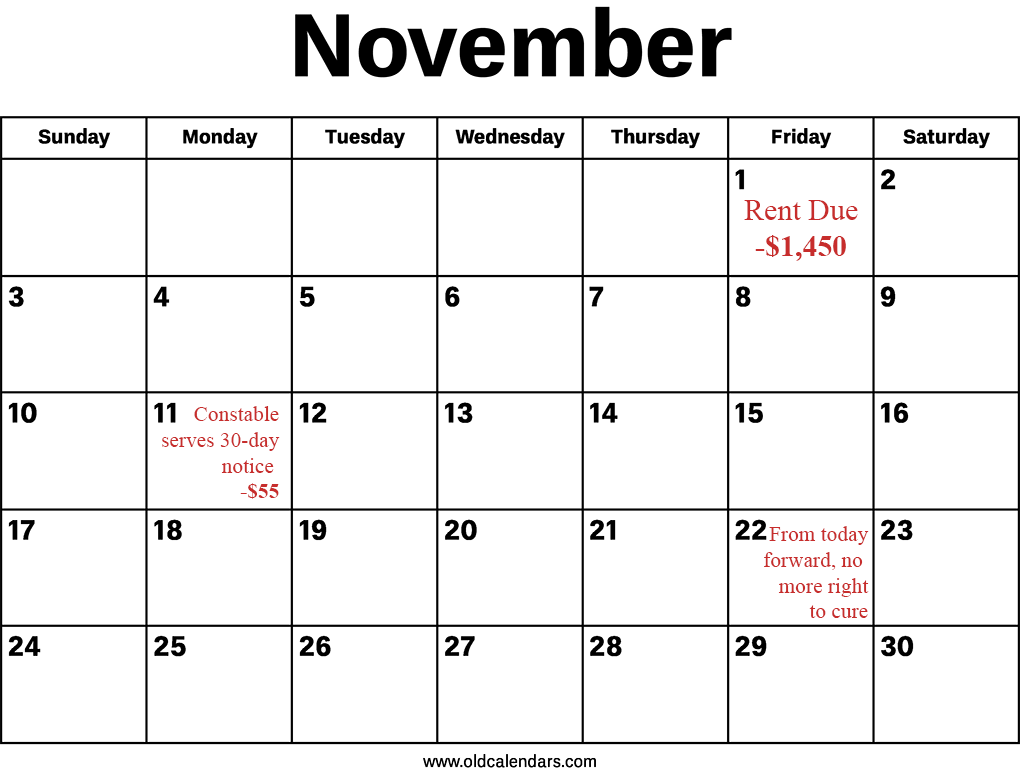
Derivative of a calendar licensed by OldCalendars.com
Eviction notices: Attestation form
If you are initiating eviction for nonpayment, you are required to include, with your notice to quit, a special state form, called an attestation to accompany a notice to quit for nonpayment.
Special city forms may be required as well, in Boston, Cambridge, Somerville and others.
Eviction notices: Delivery and wording
Plan to serve only one notice and stick with it. Make sure you list all the reasons you are evicting them in that notice. Because this example is for nonpayment, you would say so in the notice. (But if, in a different scenario, you feared they were dealing drugs, you should use a notice for cause and list the dealing and the nonpayment as two separate causes. Only information that you include in that notice may be discussed before the judge, so make sure you don’t miss anything you mean to use as grounds for eviction.)
If you serve the notice for nonpayment and your tenant offers you payment in full, take it. Under the law, tenants have the “right to cure,” that is, make good on their outstanding debt. There are slight legal differences between leased tenants and tenants at will.
Our tenant at will in this example may stop the eviction process by paying the amount of rent owed within 10 days of receiving the notice to quit. They are allowed a right to cure only one time within any 12-month period. (A leased tenant would also have the right to cure by paying all owed rent plus interest and landlords’ court costs at any time on or before the date their answer is due. Leased tenants are not limited on the number of times they may cure.)
Once the right-to-cure deadline passes, accept rent if you want to keep the renter, because that will end the eviction. If this is a repeat problem for you, do not accept rent.
However, if your tenant offers partial payments, you should accept that “for use and occupancy only,” and note that their back rent is still owed. Create a paper trail and note this on any checks you receive. Payments for use and occupancy allow you to be paid without ending the eviction, and also help a renter to contain their housing debt.
Serve a summons on the tenant.
The notice period is over starting at midnight on Thursday, Dec. 12 (December 11 is the 30th day of notice after the constable served your notice on November 11).
In our example, let’s assume your tenant has not moved out in response to the 30-day notice to quit. Your next step is therefore to serve a “summary process summons and complaint,” the technical term for eviction filing. You hire the constable again (unlike with a notice to quit, you must hire a constable or sheriff). They serve the summons to your tenant that day (this example is a little fast; in reality, the service would likely take one or two days). This official notice will cost you $150 all-in. You then file the summons with the court.
A note about e-filing evictions
You may e-file your summons if you are representing yourself in court, and the courts prefer you to e-file, so learn their system to do this. For attorneys and all parties being represented by attorneys, it is mandatory in Massachusetts that eviction forms be electronically filed with the court.
However, with evictions, some physical paperwork is legally mandatory. For instance, notices must be on paper (or rather, electronic notices are hard to prove correctly served). Therefore, when e-filing you must include an affidavit of compliance. This affidavit tells the court that you (or your attorney) filed your summary process using the e-filing method and that you served your tenants with the notice and the summons and complaint on paper. When you sign and submit the affidavit, you are also promising the court that you will bring the original notice and summons and complaint with you to your court date, and that you will provide the defendant copies of this paperwork if they request it.
As with all court processes, consult with your attorney before going forward.
Court Entry Date
If the tenant moves out immediately at this point, your minimum cost to evict would be $3,105, including lost November and December rent, plus constable fees.
You must file such that the Monday on or after filing is not more than 30 days from serving the summons. (If you fail to meet this deadline, your case is over.) This Monday is referred to as the “entry date.” Also, your entry date cannot be sooner than 7 days after serving. For this example, if you filed on December 12, immediately after serving, the first available entry date is December 23. This is the next Monday at least 7 days away.

Derivative of a calendar licensed by OldCalendars.com.
Serve the tier one court event on the tenant.
Massachusetts eviction cases follow a two-tier court process. Tier one court events, aka housing specialist status conferences, are a preliminary step to help both parties explore solutions, such as rental assistance, mediation and other resolutions that could avoid further court action.
According to court rules, the tier one event must be scheduled within 30 to 60 days of the entry date. We will use January 21 for our example tier one event. You will be notified of the tier one date within “seven calendar days” of your entry date. Considering that it’s Christmas week, we will assume the full seven days, meaning you receive the date, time and location of your tier one event on December 30. You must serve your tenant with the tier one court date once it is scheduled and given to you, no later than 14 days before the date of the event, which requires you to inform them by January 7. You are required to hire a constable for this service, another $55 fee. (For those counting, this makes three constable visits before you even get to court.)
The tier one event is a mediation. Any agreements arrived at with tenants during tier one will be legally binding. Attendance is mandatory for both landlord and tenant. The court will default tenants for not appearing. Your case will be dismissed if you do not appear.
The tier two event is a trial, in case the tier one event did not resolve the case. This will be scheduled two weeks after the tier one event, February 4 in our example. Notification of the tier two event will be provided to both parties by the end of the tier one event if no agreement is reached.
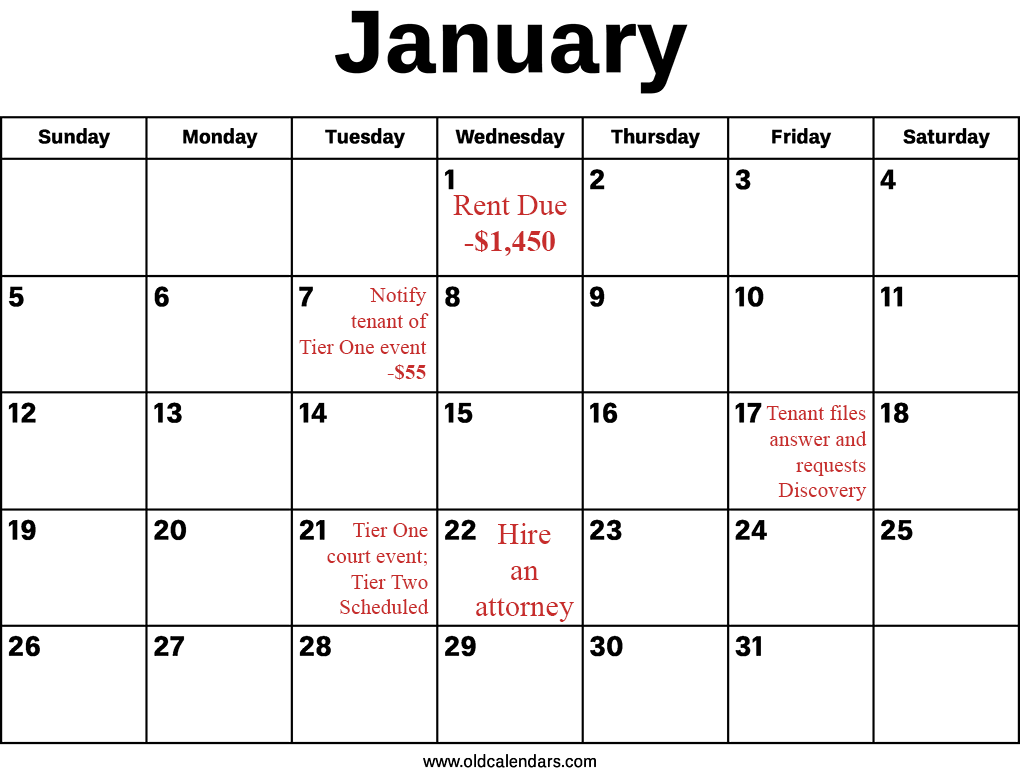
Please hire an attorney before you serve a notice. This diagram indicating "hire an attorney" mid-process is when, in our example, this hypothetical landlord decides to do so. You should do so before you start. Many easily avoidable errors can be identified by your attorney and dealt with before you expose yourself to counterclaims. An attorney might even be able to keep you out of court! Derivative of a calendar licensed by OldCalendars.com.
Your tenant may file an answer, and/or call for discovery.
Tenants are allowed to file an answer to the court summons. The answer must be received by the court no later than three days before the date of the tier one event. They may express their defense and/or file counterclaims against the landlord.
There are four main tenant defenses: 1) implied warranty of habitability (your place is not suitable for habitation); 2) covenant of quiet enjoyment; 3) security deposit law; and 4) Chapter 93A, unfair and deceptive practices. Other defenses are also possible.
They may also request discovery from the landlord. This must be filed three days before the tier one court event date. Discovery may require landlords to open selected files for the renter, including rent rolls, proof of security deposit compliance, rental agreements, insurance policies and other records.
With discovery, two things happen:
- You decide to hire an attorney (a very wise idea once discovery is called; you should have hired one before even serving a notice). The attorney will cost at least $1,000.
- Your trial date slips out two weeks.
Without discovery, we will assume the two-week rule, with a trial date of February 4.
Your tenant may apply for RAFT.
At any point during the eviction process, your tenant may apply for rental assistance, or RAFT (Rental Assistance for Families in Transition). Because a law was enacted during Covid, and remains in place, that requires courts to suspend eviction cases while a tenant’s rental assistance application is pending, this action will cause further delay.
If their rental assistance is granted, it may settle the matter. You will receive rent owed and their delinquent tenancy is cured. The amount of rental assistance may not cover all the rent owed. In that case, you will have the option of either forgiving the owed amount, negotiating a payoff of the remainder owed, or starting over with eviction or other alternatives.
If their application is denied, the eviction may continue, with a trial date delayed, we’ll say, another three weeks.
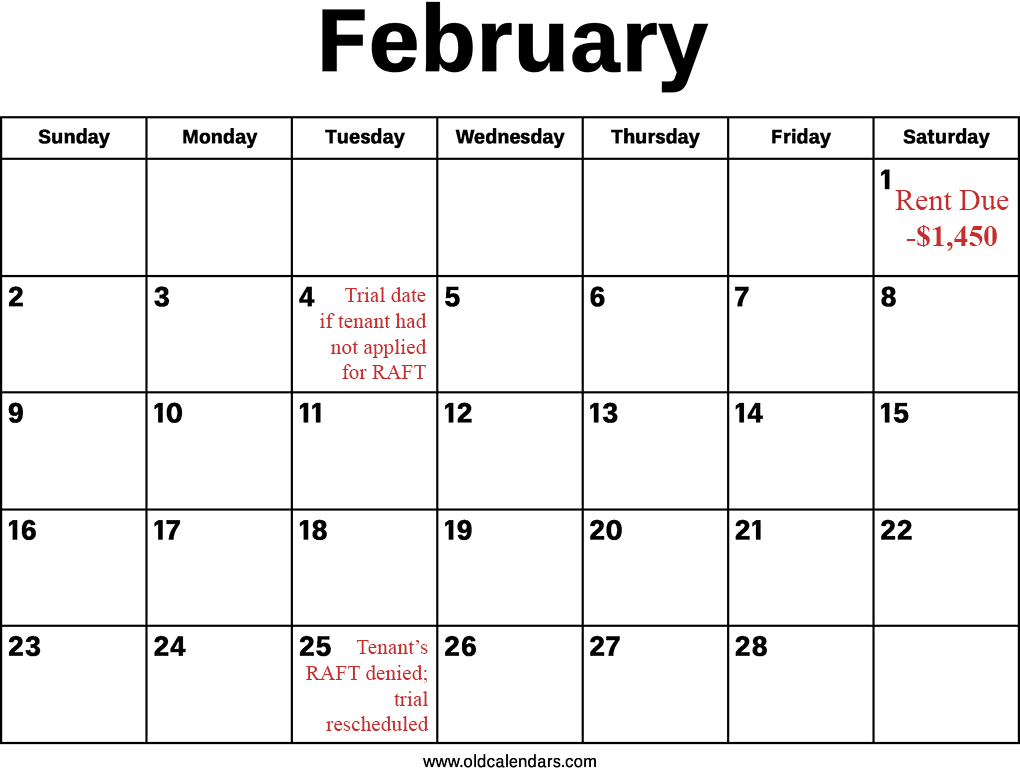
Derivative of a calendar licensed by OldCalendars.com.
Attend trial.
Your tenant applied for RAFT on the day you were scheduled for trial, February 4. Your tier two event, the trial, was delayed. RAFT was denied three weeks later (a typical turnaround time), on February 25. Your attorney moved to reschedule trial. This motion was granted, and the trial was scheduled at the next available time, two weeks after that, March 13. You and your tenant spend that day in housing court.
With February rent unpaid, and a court date set in mid-March, you are now up to five months of lost rent, plus attorney's fees and court costs, increasing your total costs to $8,510.
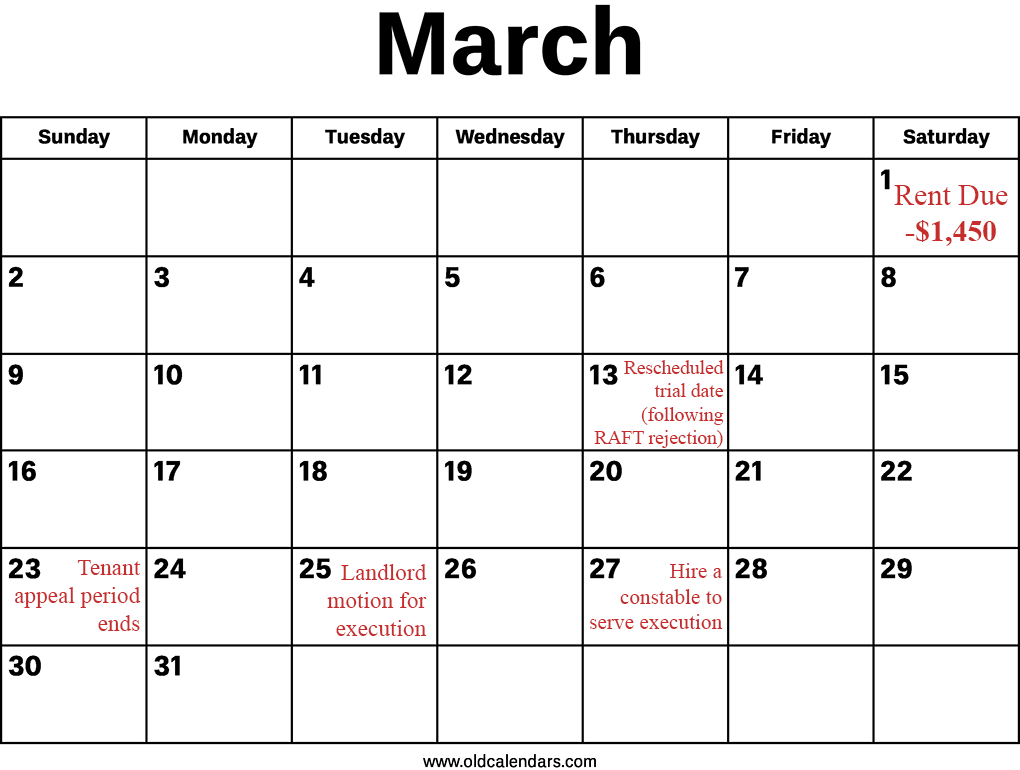
Derivative of a calendar licensed by OldCalendars.com.
Appeal ends
If you win your eviction case during trial, the tenant has 10 days in which to appeal. This period expires on March 23 (we'll assume you did a good job and the tenant and their attorney decide not to appeal).
Motion for execution
Once the judgment has been issued and no appeal is made, you can get a motion for execution. This is necessary to enforce the eviction. Because your tenant’s appeal period ended on a Saturday, your motion for execution is granted on Monday, March 25.
Once the motion is granted, typically within a few days, you can hire the constable again to serve the execution notice.
Final 48-hour notice
Execution option one: Incentivize your tenant’s move-out.
At this point, you could tell the tenants you will have them physically removed unless they leave on their own. It might nudge the tenants to move out voluntarily.
Odds are that if they haven't moved by now, the end of March, they're not going to. We don’t recommend waiting for them to leave.
Execution option two: Start the physical eviction.
Hire the constable to deliver an actual notice. You will have to coordinate with the constable and the mover. The notice must give 48 hours.
The constable delivers the notice of execution on Wednesday afternoon, March 27. This means the 48-hour notice will end on Friday afternoon, likely too late to arrange movers and a constable present. Your eviction day moves to Monday, April 1, with another month’s rent lost.
According to an eviction mover we spoke with, approximately half of tenants will move out on their own at this point. Do not think “option one” above is worth trying: The tenants that move on their own do so because the final legal process with full official notice is now taking place.
Note that, depending on the availability of movers, physical removal may actually take weeks to schedule.
Levy of execution: Eviction day
Evictions take place Monday through Friday except on holidays. You need either yourself or your authorized representative there, plus the moving company, plus a sheriff or constable to start the proceedings. You will be able to change the locks after the tenant property has been moved out.
Only a licensed, bonded, insured mover may be hired for an eviction move-out.
The moving company will probably cost at least $1,000. Shop around. Some movers have charged as little as $500 per room, others have $3,000 minimums. The constable or sheriff will cost around $300. Storage of tenant property, if they have not selected a new residence, will cost at least $750.
As you're budgeting for eviction, you also want $350 for insect extermination and at least as much for cleaning, just in case the apartment is a disaster.
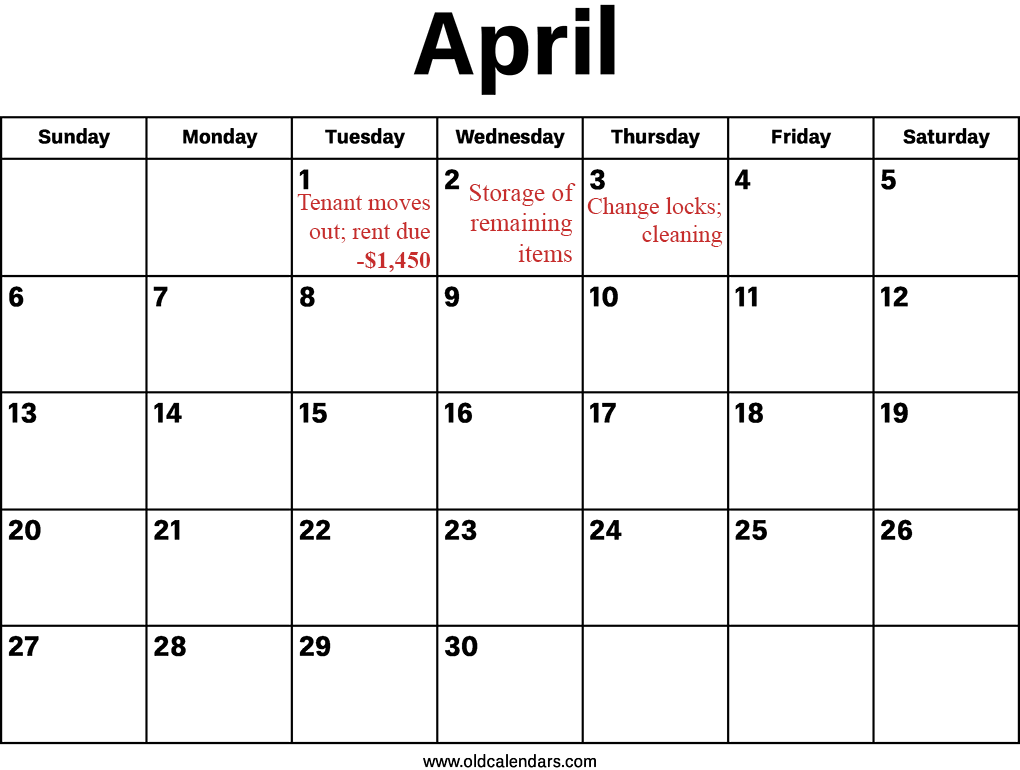
Derivative of a calendar licensed by OldCalendars.com.
Total costs and time
In this scenario, lost rent (six months) was $8,700, pre-trial costs were $260, trial costs were at least $1,000, and post-trial costs were more than $2,400. Your total losses are well into five figures.
The calendar time was 154 days from first non-payment to a legal move-and-store of belongings. We assumed the tenant took full advantage of their basic legal remedies. However, this scenario assumes a shorter time frame than it could be. For example, if the tier one event were scheduled 60 days out instead of 30, or if your tenant applied multiple times for RAFT, this eviction could be stretched out indefinitely.
In a real eviction, additional delays might also be imposed by the judge for hardship or for someone messing up the paperwork. When in doubt, hire an attorney.
Cash for Keys Alternative
Considering the substantial money and time an eviction could cost you, cash for keys is an alternative to court that may be a win-win for both you and your tenant. If you are foreseeing a long legal battle and removal before you can evict, offering your tenant a cash incentive to leave may save you money and allow you to rent out your unit again.
Essentially, offering “cash for keys” means you agree not to sue your tenant, and your tenant agrees to leave the unit, give you the keys, and not take you to court. This is completely legal, and may save you a lot of money (remember, even if you win in court, it may be impossible to collect back rent from tenants.)
In our example, if you paid your tenant, say, $5,000 in early November and they agreed to move out, you would be way ahead compared to eviction. You’d lose the $5,000 plus November rent, $1,450, for a total of $6,450. But assuming you got a tenant for December, you could subtract five more months’ rent from your losses in a court eviction, plus attorney and constable fees, for a net savings of more than $5,000.
If you do cash for keys, pay your tenant after they give you the keys and you confirm the rental unit is empty. You may be unhappy about the condition of the unit. Remember, the goal is to get possession back. You can fix the unit and move on to the next tenant. This 2018 interview with two experienced landlords discusses the advantages of cash for keys, among other issues.
Eviction Realities
Sometimes eviction is the only option. But if you plan to go to court to evict your tenant, make very certain you have managed their tenancy and rental unit to the letter of the law. There are any number of pitfalls during the eviction process that can cause it to backfire. Has the rental unit adhered to the state sanitary code for the entire tenancy? Did you manage the security deposit according to the law? Did you handle complaints reasonably and in a timely manner? A savvy renter, or one who enlists legal advocates, could exploit legal vulnerabilities to poke holes in your eviction case with disastrous results.
Our advice before moving on eviction: review this page, know Massachusetts’ eviction laws, and hire an attorney.
Sample Agreement for Judgment
Advice for Renters
